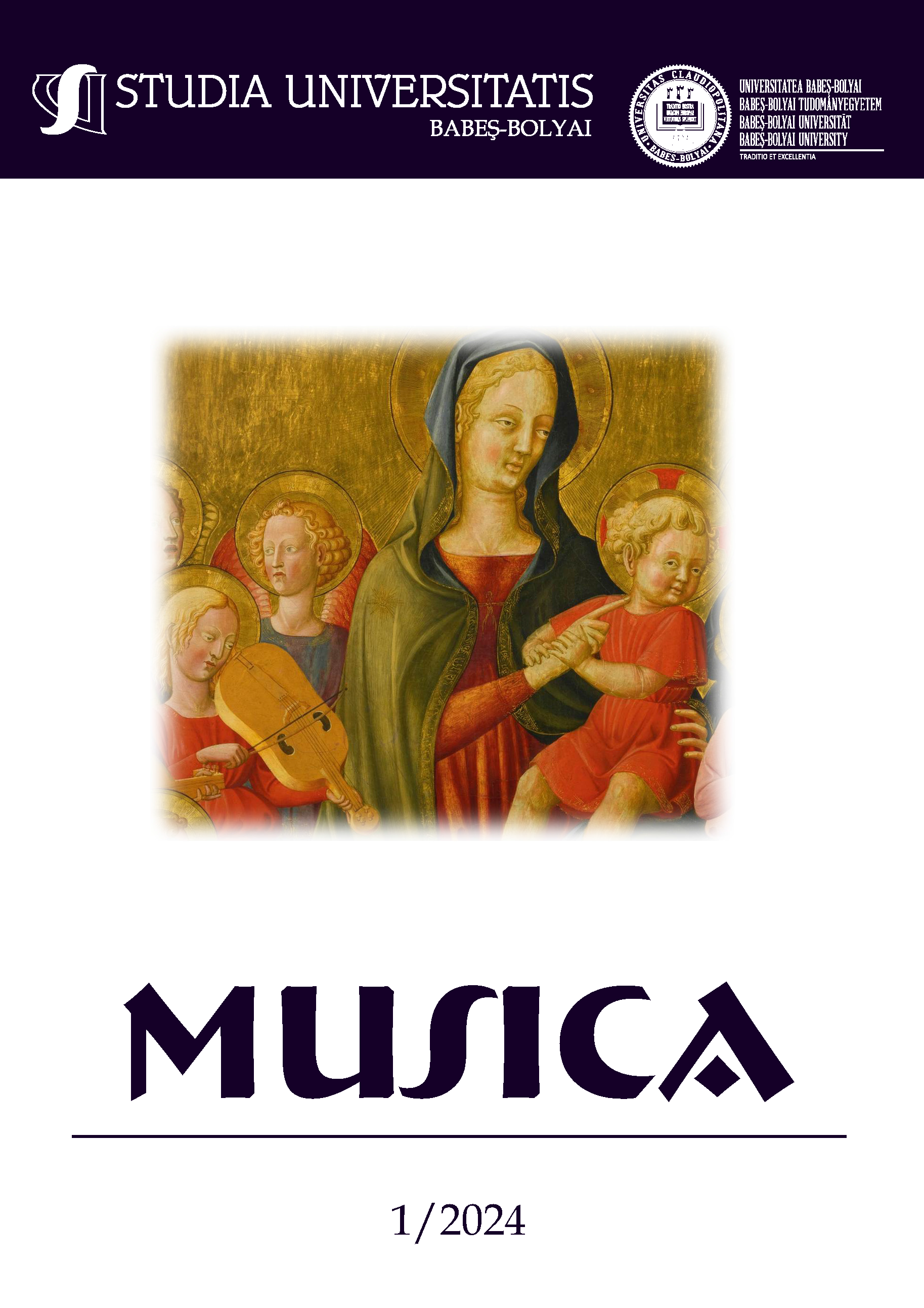Continuities and Discontinuities in Romanian Music
DOI:
https://doi.org/10.24193/subbmusica.2024.1.07Keywords:
Romanian music, Nationalism, Socialism, Leninism, folk music, progressive musicAbstract
The Romanian music has many histories. From composer George Enescu to Dictator Nicolae Ceaușescu, the Romanian music reflected multiple faces of becoming and corresponding, streaming from a varied cultural diversity and gravitating towards the central European canons. The process of creating the Romanian music shaped a dynamic and fluid image of the place and people it represents, balancing its pendulum between the western aspiration and the eastern inspiration. Moreover, it has not just one history, but many ones because the Romanian music is not a monolithic tradition, but a fusion of various customs and influences that fluctuated their presence more or less obvious along this time of becoming. Seen in a long run framed between the second half of the 19th century and the first half of the 20th century, folk music reveals as the constant component of each ideological narrative that emerged from both nationalism and socialism. This span of time is vital to understand the complex and mercurial nature of the popular or the folk that has a relation to music and song not because it describes a historical reality, but because it has been used historically.
References
“Muzica românească” (“The Romanian music”) in Muzica, 3/ 1920
Boia, Lucian, Capcanele istoriei. Elita intelectuală românească între 1930 şi 1950 (Historical traps. The Romanian intellectual elite between 1930 and 1950), Bucharest, Humanitas, 2011.
Boia, Lucian, Strania istorie a comunismului românesc (și nefericitele ei consecințe) (The strange history of the Romanian communism (and its unfortunate consequences)), Bucharest, Humanitas, 2016.
Borgovan, Ion, “La Gheorghe Enescu” (At Gheorghe Enescu) in Luceafărul, Sibiu, 16 May 1912.
Cole, Ross, The Folk. Music, Modernity and the Political Imagination, University of California Press, 2021.
Copilaș, Emanuel, Națiunea socialistă: politica identității în Epoca de Aur (The socialist nation: the identity politics in the Golden Age Era), Iaşi, Polirom, 2015.
Cosma, Octavian Lazăr, Hronicul muzicii românești, vol. II (The Romanian music chronicle), Bucharest, Ed. Muzicală, 1974.
Cosma, Octavian Lazăr, Universul muzicii românești. Uniunea Compozitorilor și Muzicologilor din România (1920-1995) (The Romanian musical universe. The Union of Composers and Musicologists of Romania (1920-1995)), Bucuresti, Editura Muzicală, 1995.
Crotty, Joel, “A Preliminary Investigation of Music, Socialist Realism, and the Romanian Experience, 1948–1959: (Re)reading, (Re)listening, and (Re)writing Music History for a Different Audience” in Journal of Musicological Research, Routledge, 2007.
Deletant, Dennis, Communist Terror in Romania: Gheorghiu-Dej and the Police State, 1948–1965, New York: St. Martin’s Press, 1999.
Firca, Clemansa Liliana, Modernitate și avangardă în muzica ante- și interbelică a secolului XX (1900-1940) (Modernity and vanguard in ante- and interwar period of the XXth century), PhD thesis, Cluj-Napoca, 1998.
Francfort, Didier, Le chant des Nations. Musiques et Cultures en Europe, 1870-1914 (The song of the nations. Music and culture in Europe 1870-1914)), Hachette Littératures, 2004.
Frolova-Walker, Marina, “From modernism to socialist realism in four years: Mayakovsky and Asafiev” in Muzikologija 2003(3)
Ghircoiașiu, Romeo, Cultura muzicală românească în secolele XVIII-XIX (Romanian musical culture in the XVIII-XIX th century), Bucharest, Ed. Muzicală, 1992.
Glodeanu, Liviu, “Apartenența compozitorului la cultura națională” (“The composer`s belonging to a national culture”) in Muzica, 3/1966.
Hitchins, Keith, România 1866-1947 (Romania 1866-1947), translated by George Potra și Delia Răzdolescu, Bucharest, Humanitas, 2013.
Jowitt, Keneth Revolutionary Breakthroughths and National Development. The Case of Romania, 1944-1965, University of California Press, 1971.
Kiriac, D.G., Pagini de corespondență (Pages of correspondence), edited by Vasile Tomescu, Bucharest, Ed. Muzicală, 1974.
Miller, Frank J., Folklore for Stalin: Russian folklore and pseudo folklore of the Stalin era, M. E. Sharpe, 1990.
Petru-Rusu, Claudiu, “Searching for identity”: the political instrumentalization of cultural traditions in Romania (1948-1965), in Studia Universitatis Babeș-Bolyai – Historia, 2/2011.
Samson, Jim, “East-Central Europe: Nationalism or Modernism?” in Nationalism and Ethnosymbolism: History, Culture and Ethnicity in the Formation of Nations, ed. Athena S. Leoussi and Steven Grosby, Edinburgh: Edinburgh University Press, 2007.
Sandu Dediu, Valentina, Muzica românească între 1944-2000 (The Romanian music between 1944-2000), Bucharest, Ed. Muzicală, 2002.
Tismăneanu, Vladimir, VASILE, Cristian, “Turneul Teatrului Naţional la Paris din 1956: Secţia de Relaţii Externe, exilul şi raporturile culturale româno- franceze” (“The National Theater tour to Paris in 1956: the External Relationship exile and Romanian French cultural raports”), in Studii şi materiale de istorie contemporană (Studies and materials of contemporary history), 8/2009.
Tucker, Robert, The Soviet Political Mind. Stalinism and post-Stalin Change, London, George Allen&Unwit LTD.
Vancea Zeno and Niculescu Ștefan, “Raportul între național și universal în lumina dezvoltării istorice a muzicii” (“The connection between national and universal in the light of music`s historical development”) in Muzica, nr. 3/1966.
Vancea, Zeno, “Specificul național și muzica cultă românească” (“The national specificity in the Romanian cultivated music”), in Flacăra, 2 July 1949.
Vancea, Zeno, “ Intonații populare românești în creația lui Enescu” (“Folk song resonances in Enescu`s creation”), in Muzica, 1/1954.
Verdery, Katherine, Compromis și rezistență. Cultura română sub Ceaușescu (Compromise and resistance. The Romanian culture under Ceaușescu), Bucharest, Humanitas, 1994.
Zub, Al, Istorie și istorici în România interbelică (History and historians in the interwar Romania), Iasi, Junimea, 1989.
Downloads
Published
How to Cite
Issue
Section
License
Copyright (c) 2024 Studia Universitatis Babeș-Bolyai Musica

This work is licensed under a Creative Commons Attribution-NonCommercial-NoDerivatives 4.0 International License.



